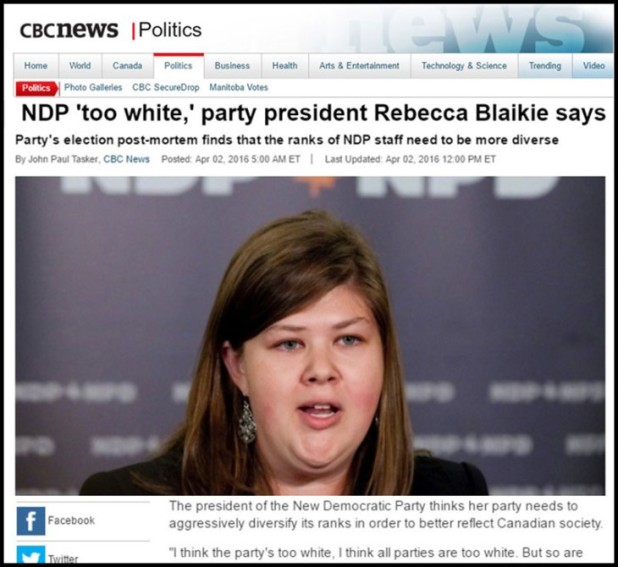The New Observer
April 6, 2016
The president of Canada’s third largest party, the New Democratic Party (NDP), has announced that all parties in that country are “too white” and that this urgently needs to be changed.
The comments, which would have landed her in court on “race hate” charges if she had said that all parties were “too nonwhite,” were made by NDP president Rebecca Blaikie live on air on CBC Radio.
Discussing her party’s newly-released “Campaign 2015 Review,” which had been commissioned to establish why the NDP had lost 59 seats and slipped from first to third place in the polls during the 2015 federal election, Blaikie said that the NDP “needs to aggressively diversify its ranks in order to better reflect Canadian society.”
“I think the party’s too white; I think all parties are too white. But so are we, and so let’s start doing some better outreach and acknowledging that, so we can change the look of the folks around the table,” Blaikie said in an interview on CBC Radio’s “The House.”
The party’s review said that it needs to reach out to a “broader and more diverse audience,” which could be achieved by “diversifying our staff by reaching out into under-represented communities.”
Blaikie added that her party’s effort to recruit “diverse candidates” has fared well because “it crafted policies and set targets to recruit candidates of color, indigenous candidates, and candidates living with disabilities,” and noted that the NDP had run the “most diverse slate of any party in Canadian history in the last election.”
NDP leader Tom Mulcair is widely believed to have sunk the party’s electoral chances when he announced that he would support the right of “new citizens” to wear the Muslim veil, the niqab, at all citizenship swearing-in ceremonies.
“[The niqab] hurt us terribly,” Muclair Blaikie admitted in an earlier interview. “It was measured. I can share with you that the polling we did showed we dropped over 20 points in 48 hours here in Quebec because of the strong stand I took on the niqab.”
Despite this, Blaikie insisted that it “wasn’t only” Mulcair’s support for the niqab that sank the party, but also the party’s “failure to craft a distinctly Quebec-focused campaign.”
Mulcair, who will be the subject of a leadership review vote at the party’s convention during the second week of April, faces criticism for his performance from party members. A leadership election could be triggered if 50 percent plus one delegate at the convention supports such a move.
The party’s election review said that the party also had to “identify missing voices and diversifying our staff by reaching out into underrepresented communities,” and strengthen its “internal call to action in the fight against racism and discrimination by developing outreach, engagement, and communications strategies that reach out explicitly to a broader and more diverse audience.”
The party also wants to “further efforts to diversify our caucus and staff, as well as explore the potential for strategic communications in a wider variety of languages,” and develop a “network of support for indigenous candidates, candidates of color, and people living with a disability.”
Any party adopting a program which substituted the word “white” with any of the groups so named would instantly be accused of being “racist” and could even be prosecuted for “race hate.”
However, because these measures are designed to discriminate against whites, there will be no media uproar, and no condemnation from other parties—yet more evidence that there is one set of rules for white people, and a completely different set of rules for everyone else.
 Daily Stormer The Most Censored Publication in History
Daily Stormer The Most Censored Publication in History



